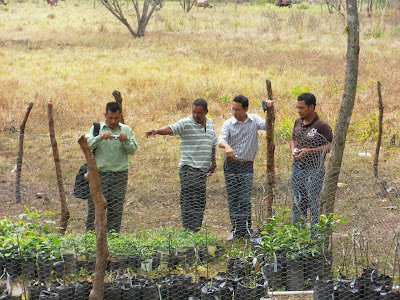Each community meeting followed the same general format but it was interesting to hear their unique experiences, priorities and attitudes. Honduran culture is very relationship oriented so, after the opening prayer, each person took the time to stand up, introduce themselves and describe their role in the community. The next order of business was the history of the community – when was this area settled and what was it named after? For the most part, the CRWRC workers had never been in that particular community before which makes it important to start with this fundamental narrative.
 |
| Our meeting took place inside the Christian Reformed Church in El Carrizal |
CRWRC is also very concerned about the future of the community and they asked a lot of questions about their plans. When Diaconía starts working in an area the first thing they do together is write out the community’s major goals and vision for the next 5 to 10 years. Ultimately, CRWRC wants to know their priorities and how Diaconía Nacional’s projects are helping to actualize these goals. Some other key elements of the evaluation process involved themes of social justice and equity, the role of the church in the community, women in leadership positions, communal decision-making, and co-operation with other local church denominations.
The Olancho evaluation team visited four communities: El Carrizal, El Guanabano, Escoto, and El Coyolar. As I expected, the coffee project was an important topic for El Carrizal as the farmers have really benefitted from a few years of training in soil conservation and organic farming strategies. It was very encouraging to hear the stories from Guanabano. They highlighted the community’s effort to work co-operatively with the local Catholic church and their hopes for an even more productive credit union this year. The meeting in Escoto dealt a lot with their plans for a water project. Most of the neighbouring barrios have gravity fed water systems but Escoto struggles to power the pump necessary for their system. El Coyolar was another great community to visit – especially since the King’s University’s Honduras Water Project team was there just last May! The water project was completed only a few months later and the people of El Coyolar were very appreciative of Diaconía’s support.
 |
| An individual from El Guanabano showing CRWRC staff the results of his training with DN regarding the environment and agriculture. |
The last question (and probably one of the most important questions) involved suggesting a hypothetical scenario where Diaconía Nacional would have to withdraw support from that community in order to meet the pressing needs of another community – how would the community respond? Every non-profit organization faces the same unfortunate reality: limited resources to deal with a daunting list of needs. It is really rewarding and engaging for the DN staff to work with enthusiastic communities but there is always a point where the people need to take ownership of their own development plans. The mission statements of CRWRC and Diaconía both illustrate the importance of honouring and developing the potential of individuals and their communities. The goal is to equip people to recognize their strengths, support one another, and ultimately take action to work for a better future.
In response to this scenario, all the groups communicated their desire to continue working with Diaconía Nacional. However, a few leaders reverently stood up, expressed their sincere gratitude to DN and then graciously admitted that there are a lot of communities in worse situations. Essentially, these admirable leaders recognized their needs in a larger context and committed to maintaining their development plans should DN have to withdraw its support. That may have been one of the clearest indications that the work of CRWRC and Diaconía Nacional is genuinely empowering individuals and transforming their communities.
 |
| Our lunch in El Coyolar was interrupted by a sudden downpour so we all had to squeeze in underneath the porch roof |
 |
| DN staff member, Isai Moreno, with a parrot from Escoto that was unable to attend the meeting... |
Carol,
ReplyDeleteIt sounds like you are having a great time and learning some exciting and powerful things... I'm a bit jealous!!! Keep posting so we can live vicariously through you!
G says: I love you!
J